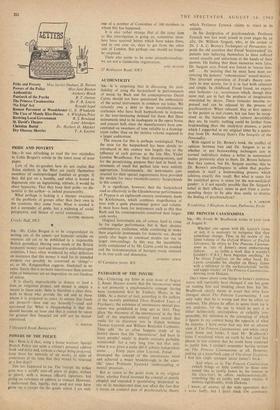PATRIARCH OF THE PSYCHE
SIR,—Criticising my letter in your issue of August 2, Renee Haynes asserts that the unconscious mind is not primarily a psychoanalytic concept, having been, formulated first by Frederic Myers in the 1880s. As a matter of fact, according to the authors of the recently published Three Hundred ,Years of Psychiatry, the existence of unconscious mental pro- cesses was postulated as long ago as 1651. They place 'the discovery of the unconscious' in the 'first half of the nineteenth century' and record that credit for its discovery was in dispute between Thomas Laycock and William Benjamin Carpenter. They add. 'As so often happens study of its history shows that the "unconscious" had been in many peoples' minds' (a double entendre probably unintended) 'for a very long time but that only when it was given a name did it achieve independent status. . . Forty years after Laycock, Freud . . . developed the concept of the unconscious mind and achieved a major breakthrough in the scien- tific' (pace Professor Eysenck) 'understanding of mental processes. . .
But to return to the point made in my original letter, whether Freud invented the concept or merely adopted and extended it (postulating 'projection' as one of its mechanisms) does not affect the fact that it forms an essential part of psychoanals/tic theory which Professor Eysenck claims to reject in its entirely.
In his denigration of psychoanalysis, Professor Eysenck was last week joined in your pages by an ally, Dr. William Sargant, who, in his review of Dr. J. A. C. Brown's Techniques of Persuasion, re- peats the old assertion that Freud 'brainwashed' his patients into believing themselves to have suffered sexual assaults and seductions at the hands of their parents. On finding that these memories were false, Dr. Sargant says, Freud was forced to 'rescue him- self . . . by insisting that he must have been un- covering the patients' "subconscious" sexual desires.' This distorted exposition of Freud's theory con- ceals its true nature, for it is in fact both coherent and simple. In childhood, Freud found, we experi- ence fantasies—i.e., occurrences which, though they seem real, are in fact the products of imagination stimulated by desire. These fantasies become re- pressed and can be released by the process of psychoanalysis. When released, they at first appear to the patient as real events, but can later be recog- nised as the fantasies which (almost invariably) they are. In reality, nothing could be farther from brainwashing than the analytical process, a point which I supported in my original letter by a quota- tion from Dr. Anthony Storr's The Integrity of the Personality.
With regard to Dr. Brown's book, the conflict of opinion between him and Dr. Sargant is as to whether or not brainwashing techniques can in normal individuals induce a belief in nonsensical matter previously alien to them. Dr. Brown believes that they cannot, but Dr. Sargant ascribes this to Dr. Brown's unwillingness to admit that psycho- analysis is itself a brainwashing process which achieves exactly this result. But what is sauce for the analytical goose is sauce for the non-analytical gander: is it not equally possible that Dr. Sargant's belief in their efficacy stems in part from a corre- sponding desire to be able thus easily to dismiss the finding of psychoanalysis?






























 Previous page
Previous page